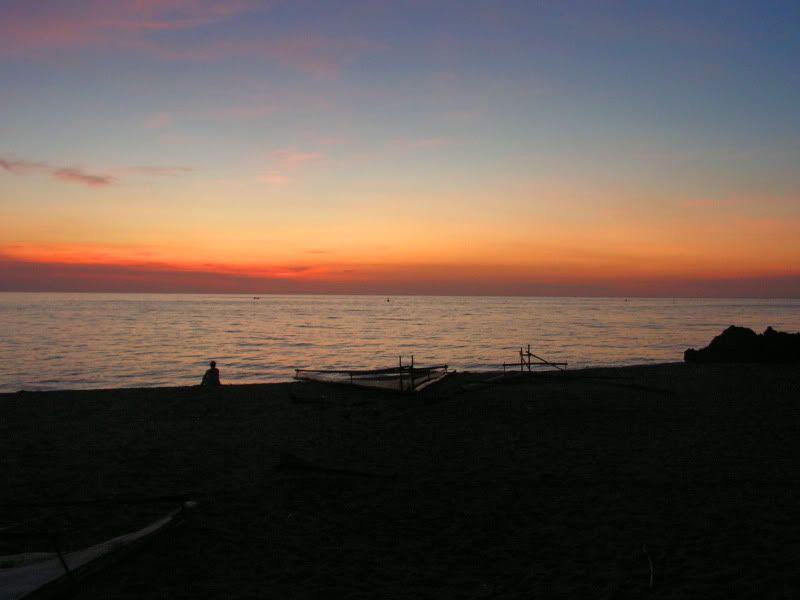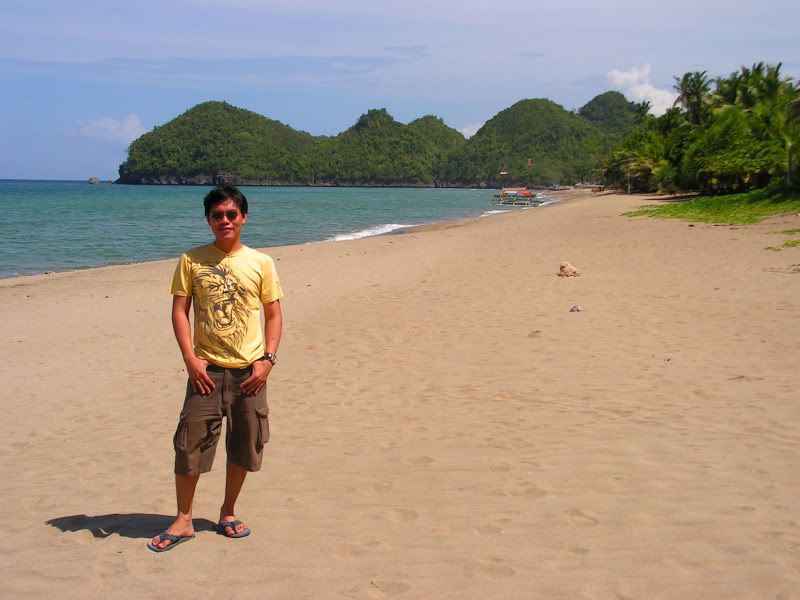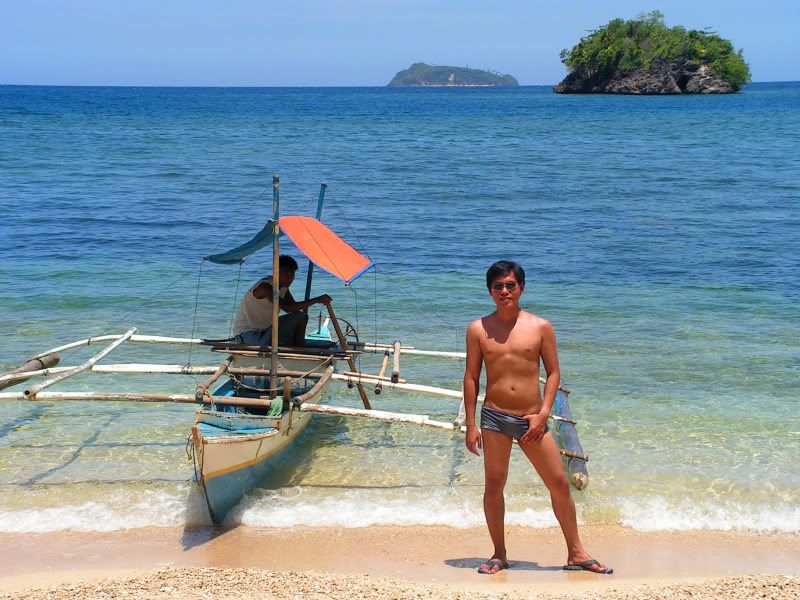Sunday, April 19, 2009
 1:39 PM |
Sipalay Sunset
1:39 PM |
Sipalay Sunset
First of Six PartsI have never seen this kind of sunset before—a tantalizing dollop of hot orange lava perfectly suspended in the sky, taking its time to sink into the horizon off Sulu Sea. Or perhaps, thinking twice now about it, I may already have, but not with this kind of concentration, in a heightened awareness of the drama unfolding before me.

It is the ultimate cliché, of course: writing about beautiful sunsets. Every second-rate poet has purple verses extolling the play of luminosity set against a darkening blue of sky, tendrils in various hues of orange, as it disappears into the slow nothingness of dusk. Every hack of a photographer begins with tenderly composed snapshots of impossibly blinding clouds shimmering with magic light. But here I go, doing exactly that. Coming out of my beach-side cocoon after a late afternoon cup of brewed coffee, a shot of caffeine in my system that has suddenly made everything around me seem sane and stable, I had marched into the sandy shallows of Sugar Beach to wet my feet, and when I looked up, the dollop of lava gripped me.
I quickly realized that our days—a cynical age where everything can no longer be taken at face value, and romanticism has become the province of fools—have made our sincerity of regarding the frank beauty of things (such as sunsets) seem like a naïve deal. But suddenly I felt like I was being given a vacation from all that postmodern cynicism. I fell into the setting sun without reservation, without the slightest sense of irony, and I was in many ways glad.
I sat on a mass of driftwood stuck on the sand. It was large enough to make for a makeshift, nature-carved “sofa.” I sat on it and looked out at sea, into the orange ball slowly descending into the horizon. With a pair of shades, I could behold its shape more, and there was something tantalizing about its wobbly circle: it felt organic, a living breathing thing of fierce colors. “It’s beautiful,” my friend Moses tells me. We are both looking into it now.
“Yes, it is,” I said.
“I’m glad we don’t have a camera to capture this,” he said.
“How so?”
“Because then we can really strive to remember this moment.”

Perhaps Moses was right, because I found myself nodding in agreement. And then we beheld the sunset once more together, in silence, watching it as it slowly eased into the sea. The setting of the sun was becoming fast now. After a few seconds, half the sun had submerged. After a few more seconds, only a quarter remained. The descent felt like the height of drama. And then slowly, slowly, inches of the fiery ball had disappeared into the horizon, till only a sliver remained. Then it simply glimmered out of view, and all that was left were traces of orange light scattered everywhere.
“Somewhere out there,” I said, “that’s someone else’s sunrise.”
It was only then that we noticed the beach was full of people doing exactly the same thing we were doing, watching the sun set, in a kind of communion reserved only for the sacred. People had stopped swimming to gaze into the orange glow. A beach volleyball game had stopped. A fat middle-aged woman had pulled up a chair and propped it up in the middle of the beach, where she sat like a queen. In the protracted moments that followed after the sun finally disappeared, we all moved in a kind of suspended motion, continuing what had been before our sight was arrested by the drama off the horizon. The children and many of the swimming adults went back to splashing water on each other, their shouts of utter glee piercing through the din that was Langub Beach Resort; those who were talking continued on with their halted conversation; those who were eating, or drinking, went back to the mechanical action of putting spoon or bottle to mouth.
Life went on. But for one brief moment, everybody shared a sunset together.
The slow day—the Monday before the beach madness that grips the rest of Holy Week comes in full force—gets anyone ready for this: I had woken up to the day with a sense of unfamiliar leisure to find it was already midmorning. On ordinary days, that would have had me in immediate panic—because back at home, in the city, there were lists of things to do and tick-off. But I woke up to a muggy nine o’clock, in a bed with a gracious canopy of a mosquito net, surrounded by walls done up in resort-style, varnished amakan and nipa. There was only a pervasive quiet that told me I was not in Dumaguete anymore. The distant hush of surf crashing on sand was what finally made me find my bearings in the strange room: it was only then that I remembered, with the clarity of wakefulness, that this was my second day in Sugar Beach—what the locals call Langub—in the small barangay of Nauhang, in a secluded cove accessible only by pumpboat in the town of Sipalay in southern Negros Occidental.
Sugar Beach is a long stretch of utter quiet facing Sulu Sea, punctuated on both ends by hills of coral stone and small forests. The beach itself is separated from the rest of Negros Occidental by a narrow band of river called Nauhang. The town proper of Sipalay is still a good distance away, accessible only by small tricycles that can charge you an arm and a leg if you look very much like a tourist and you’re not careful. (Don’t be fooled: the fare from Nauhang to the Sipalay public market, via Gil Montilla, is only P20 per head. And not P150.)

In Sugar Beach, once you’ve settled in, you can swim or frolic in the clear waters, or kayak, or snorkel, or dive to sunken ocean vessels offshore. Or you can write, or catch up on reading, or sleep in a hammock, or do nothing but think about sun and surf. There is limited Internet access in a handful or resorts lining the beach, and for a price that’s bordering on atrocious—so one can very well call Sugar Beach a place of utter seclusion. The days here are never boring, but they can pass by like the thickest of molasses. Still, sometimes this is the one thing we need as respite from our increasingly mad world: we sometimes need days dripping to a close like molasses—and that is also the one exact thing that makes one behold beautiful sunsets with the sensitivity of the unabashedly romantic. And become moved by its everyday, awesome drama.
(To be continued…)Labels: life, negros, travel
[0] This is Where You Bite the Sandwich
GO TO OLDER POSTS
GO TO NEWER POSTS

















 1:39 PM |
Sipalay Sunset
1:39 PM |
Sipalay Sunset


